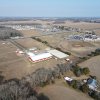The following letter was sent to Tiana Blount, regional coordinator for Community Action for a Renewed Environment, EPA Region 3, with a copy submitted to the Cape Gazette for publication.
I learned of your organization via the internet and noted that is helps communities fighting pollution per you website:
Community Action for a Renewed Environment is a competitive grant program that offers an innovative way for a community to organize and take action to reduce toxic pollution in its local environment. Through CARE, a community creates a partnership that implements solutions to reduce releases of toxic pollutants and minimize people's exposure to them. By providing financial and technical assistance, EPA helps CARE communities get on the path to a renewed environment.
I represent a group Protecting our Indian River in Millsboro. Our community is made up of mostly low-income, blacks, whites and Hispanics. A lot of us are old and retired, living on fixed incomes. We do not have the means to do battle with our state government.
We are currently in the process of fighting a proposed poultry slaughter house in our community. The land that they plan on using is an old pickle processing plant that the grounds have been classified as a superfund site/brownfields. They also plan on discharging 12 million gallons of wastewater from cleaning two million chickens a week into the Indian River which is already a burdened with pollution.
Our Department of Natural Resources and Environmental Control is not listening to the information we have developed, and wants to issue permits for the discharge into the river and for a hazardous industry in a community that is overburdened with many other industries.
Within a two-mile radius we have a concrete/asphalt plant, a wastewater treatment plant, a pharmaceutical plant, another poultry slaughter house, a poultry rendering plant, a grain mill, a coal burning power plant, our town is considered a cancer cluster, and we do not need any more industry.
The current poultry slaughter house already produces 112,280 tons of methane gas a year which is basically carbon dioxide and now a mile away they want to add another facility that will produce the same amount and double the amount of methane gas which is a potent green house gas in a two-mile radius.
This is the air that we breath and the water that we use for fishing, crabbing and recreation. This is 2013, not 1980; you don't discharge into our rivers and streams with waste from cleaning poultry.
If there is such a thing as environmental justice, ours is being violated! There are two elementary schools a mile away from the proposed plant; children are more prone to illness than any group. Industrial pollution is killing us!
Also, 200 trucks a day plus 700 employee cars will cause traffic gridlock in our small community and add to the greenhouse gases from the large trucks hauling the chickens and the renderings.
Our group has investigated the site thoroughly thru the help of many professionals only to find out that there is a lot of toxic chemicals in the ground and right next to a area that is considered a watershed of the Chesapeake Bay.
Our state government officials will not listen to our concerns; their only concern is the 700 jobs in an industry that has a very high overturn rate and a very poor safety record.
These are only a few of the facts; many more remain to be told. We have a web site: www.protectingourindianriver.com and also a FB page Protecting our Indian River.
Is it possible that you could contact me and discuss the possibility of your group helping us either by a donation of money or professional help to protect our health and environment?
Jay Meyer
Protecting Our Indian River























































